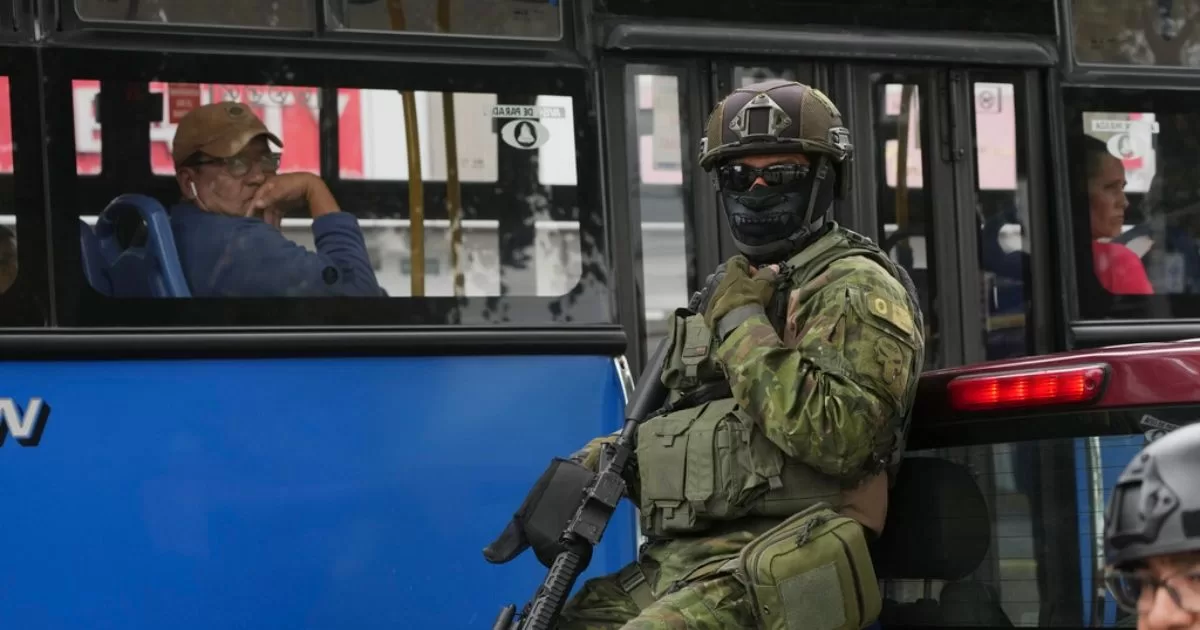Knowing that actions to address insecurity could have a cost in the long run, the President Daniel Noboa It is already considering measures to be able to finance them, through increased taxes, immediately generating controversy.
Carrying long weapons, the military and police paid special attention in their searches to citizens carrying backpacks or suitcases in public transportation facilities in the heart of downtown. Quitowhere the day before a bomb alert caused the mobilization of the police who, after an operation that included the use of trained dogs and a robot, were able to rule out the threat.
“I hope that the checks are carried out on all people if it is going to be checked for security reasons, that it is on everyone and not a specific part of the population that has been the problem that has occurred lately in the checks,” he said. citizen Daniela Chacón during a review in Quito.
The situation of violence in Ecuador escalated dramatically over the weekend after the mysterious disappearance in a medium-security prison in Guayaquil of capo Adolfo Macías, alias “Fito”, head of the most dangerous criminal group in the country, The Choneroswhich maintains a relationship with the Mexican Sinaloa Cartelaccording to authorities, and the subsequent escape from another prison of Fabricio Colón Pico, a regional criminal leader of another criminal organization, The Wolves.
In a video posted on social media, Colón Pico offered to surrender in exchange for the authorities guaranteeing his life.
Noboa, who took power at the end of November, first declared a state of emergency at the beginning of the week and later declared that the country was entering a internal armed conflict in which the military objective was about twenty criminal organizations linked to drug trafficking and other crimes, which he described as “terrorists.”
The measures led to a greater deployment of the military and police in streets and strategic areas of the capital and other cities where violence hits with greater rigor. The population, fearful, apparently welcomes the measures.
In the main cities, dozens of citizens have gone to sites protected by the military and police to spontaneously offer them soft drinks, sandwiches, cookies and other provisions, especially at night.
Finance the conflict
On the other hand, the Noboa government sent a letter to the Legislature at night emergency economic law proposal in an effort to seek income to financially sustain the conflict, which at its core proposes raising the value added tax from 12% to 15%.
This proposal must be analyzed and approved or denied by legislators. If there is no response within 30 days, it will automatically come into effect.
For the analyst and professor at the Central University, Santiago García, this proposed increase would negatively impact “the economic growth of the country” after arguing that “it will have a very strong effect on the drop in production and the drop in consumption levels.” .
“It represents an advantage for the State but a disadvantage for the citizen,” he added.
A good part of Ecuadorians continued this Friday in teleworking mode and with schools in virtual classes, while most businesses and businesses remained closed for fear of the state of violence.
The crisis escalated on Tuesday when a group of hooded armed men burst live on the TC Televisión channel in Guayaquil. The Ecuadorians witnessed how they intimidated journalists and workers of that media with long and short weapons and explosives. The police neutralized the armed men. The incident left a cameraman injured by a bullet in the leg.
Noboa visited the channel’s facilities on Friday amid a large security contingent. “I come to see the people who were victims of a terrorist attack, who work for a state media… I come to see them and show solidarity with them,” he said.
The violence does not stop
The violence was far from being appeased despite all the military and police deployment, particularly in prisons.
During the early hours of the morning, a body was thrown from the prison in the city of Machala – 373 kilometers southwest of Quito – towards the outside and the authorities confirmed that it was a murdered prisoner.
The penitentiary system said in its most recent report that 170 officials – 155 guards and 15 administrative staff – are being held in seven prisons, eight less than the previous day, after the release of eight between Thursday and Friday, it said.
The spiral of violence of recent days also left at least 14 dead in the coastal city of Guayaquil, according to police reports. The number of deaths at the national level has not been provided.
Reactions
In the midst of the emergency measures, the spokesperson for the United Nations High Commissioner for Human RightsMarta Hurtado, in a press statement, stated that any measure to confront violence in the country “must be proportional and limited to what is required by the security situation.” She added that any restrictions on rights must respect the principles of legality, proportionality and non-discrimination.
The Organization of American States (OAS)for its part, expressed on Friday its “deep rejection” of the violent acts that cause a “serious crisis and social commotion” in Ecuadoraffecting society in general.
The body unanimously approved a statement supporting the government’s efforts “to restore order” and urging it to “firmly defend the rule of law and respect for human rights.” He also offered whatever technical cooperation was possible, in response to the request of Ecuadorian Foreign Minister Gabriela Sommerfeld, for “decided support” from the region to “eliminate violence and fight international organized crime,” which, he said, left In 2023 more than 8,000 violent deaths in the South American country.
Source: With information from AP


